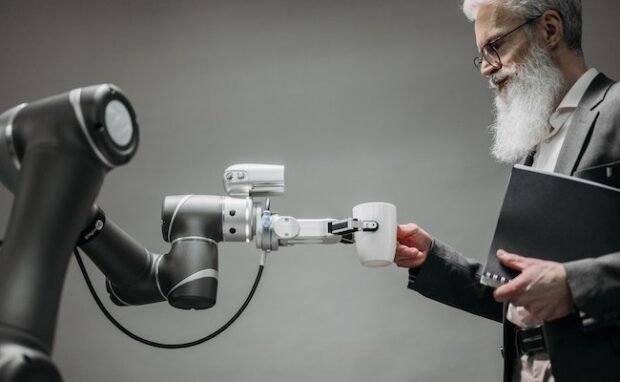AI’s impact on the Philippines: Today, BPOs. Tomorrow, other sectors.
Artificial intelligence expands its impact on the Philippines as the private and public sectors explore its benefits and risks. For example, the Contact Center Association of the Philippines (CCAP) recently said generative AI would positively impact the local sector. Meanwhile, the government has been passing regulations for this technology.
ChatGPT started a job revolution that will change numerous workplaces in various sectors. Some people believe it will open more jobs, while others dread it will take them away. Nevertheless, you must prepare for its inevitable impact on your life.
Understand this technology further and adapt to it by reading this article. It will discuss the recent statements from prominent business and government leaders in the Philippines. Then, I will cover its benefits and risks and explain how you can adapt immediately.
What do the PH private and public sectors say about AI?
DTI (@dtiphilippines) wants to position #Philippines as #AI powerhouse #iamDTIphhttps://t.co/wdhKJyCbTU
— DTI London (@DTILondon) March 28, 2021
Inquirer correspondent Alden Monzon shared a statement from the Contact Center Association of the Philippines regarding AI’s impact on the country’s BPO industry. Contrary to popular belief, it believes this technology will positively affect call centers.
CCAP president Mickey Ocampo says, “ Generative AI can be used to automate and enhance various aspects of customer interactions. Some examples are chatbots and virtual assistants. These are automated email responses for faster adaptability.”
Ocampo added, “To Illustrate, in the past, when an agent needed to respond to a customer’s call, he had to look at the (customer relationship management software) and backtrack or even go to the knowledge base. Now, these things are automated, further enhancing agent productivity.”
Generative AI uses machine learning to produce text and other media. The most popular example is ChatGPT, which gained over 100 million users in a few months.
CCAP board member Pushkar Misra said generative AI would create more high-complex jobs. More importantly, he downplays fears it will cause massive job losses.
“It does not really make some tasks obsolete, but instead, it reinforces the need for upskilling and re-skilling of talents, which are already being done across the industry,” Misra says.
You may also like: The future of AI chatbots
According to Inquirer Business, the Philippine contact center sector expects to earn $59 billion in revenue by 2028. Moreover, $49 billion will come from CCAP-member firms.
On the other hand, Representative Robert Ace Barbers filed an AI bill in the House of Representatives on March 1, 2023. The attached note says the bill will maximize AI’s benefits and reduce risks.
Senator Imee Marcos published a press release titled “Regulate Artificial Intelligence Before It’s Too Late.” Moreover, Senator Risa Hontiveros called on the Department of Trade and Industry to prevent AI from taking over PH call centers.
What are the pros of AI in the Philippines?

I covered the benefits and risks of artificial intelligence in workplaces in 2021 and have been reporting more ever since. Here’s how AI could improve businesses in the Philippines:
- Call centers could become more efficient by delegating simple tasks to AI chatbots. For example, a company may integrate ChatGPT into its website to answer frequently asked questions. As a result, its agents could spend more time resolving more important customer queries.
- Artificial intelligence can predict patterns in customer behavior, enabling businesses to adapt their products and services as soon as possible. As a result, they can continue gaining sales and customers.
- Chatbots collect customer data to facilitate lead generation, improving advertising and marketing campaigns.
- Then, AI can use that information to target demographics accurately, making ads more efficient than ever.
- Small businesses may start using chatbots to boost customer service and reduce spending. Then, they could expand to human agents as they grow.
What are the cons of AI in the Philippines?

Many people have been worrying about artificial intelligence’s negative effects. For example, several tech leaders signed an open letter to suspend AI research.
You may also like: How to throw virtual events
They believe AI may take over significant portions of society if left unchecked. Moreover, it may pose more immediate risks to the Philippines:
- The country’s private and public sectors fear generative AI may take over millions of jobs, especially in the BPO industry. AI chatbots may become so advanced they can converse with customers and provide answers like humans. Eventually, they may remove the need for human call center agents.
- Placing accountability on these AI technologies may become complicated. Generative AI creates inputs based on user prompts. However, you can only sometimes guarantee they will produce the desired results. As a result, AI customer chatbot issues can become difficult to explain to clients.
- Chatbots have no empathy like humans, which could make them unsuitable for various roles. For example, people have been using chatbots for mental health therapy. Sahra O’Doherty, director of the Australian Association of Psychologists, warned this activity is dangerous.
- Other nations have been using artificial intelligence tools in places of worship. For example, a German church recently hosted a sermon featuring generative AI and virtual avatars. Soon, the country may need to contend with this technology in religion.
How to prepare for AI’s impact on the Philippines?

Everyone worldwide is adapting their careers to artificial intelligence. If you’re unsure whether your job is at risk, answer the following questions:
- Is your job too specialized?
- Do you perform the same task over and over?
- Is your work data-driven?
You may also like: ChatGPT experience is now an important career skill
Answer “yes” to any of these questions, and you should consider finding a new job. Most AI jobs require specialized training. Fortunately, there are others well-suited for non-techies:
- Prompt engineer
- Artificial intelligence writers
- Chatbot designer
- Virtual assistant
- Language translator
- Digital artist
- Game writer
- AI ethicist
- Domain expert
- Data analytics translator
You can learn more about these positions by reading my other article. Also, consider taking free artificial intelligence courses on YouTube and other learning platforms.
Conclusion
Business groups and government organizations have anticipated artificial intelligence’s impact on the Philippines. Technological advancement is inevitable, so everyone must adapt.
The country must find ways to maximize AI benefits and minimize risks. Meanwhile, you should do what you can to learn more about these technologies.
Fortunately, you can start by reading more Inquirer Tech articles. The website reports the latest tips and trends regarding artificial intelligence, gadgets, and more.
Frequently asked questions about AI in the Philippines
Does the Philippines use artificial intelligence?
Real estate company BRIA says the “application of artificial intelligence in the Philippines is still in its infancy at the moment.” Yet, numerous sectors have been benefiting from AI research. For example, the company says the local healthcare sector has been using this technology to improve patient care.
How does AI impact our lives today?
ChatGPT made artificial intelligence popular worldwide, but it is already in your favorite gadgets and apps. For example, the online chat app Snapchat launched a virtual assistant called “My AI.” Moreover, Adobe implemented generative AI into its Photoshop program to create the Generative Fill feature.
How will AI affect education in the Philippines?
Artificial intelligence could become a double-edged sword for the Philippines’ education system. A research paper from the University of the Philippines says it would “enable educators to focus more on teaching and engaging with students, enhancing the overall learning experience.” However, schools must prevent AI from becoming a cheating tool.


















